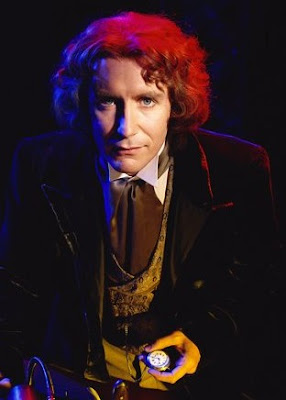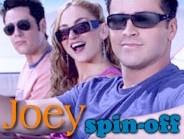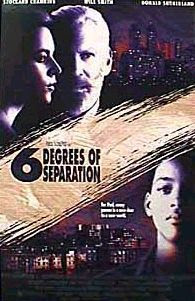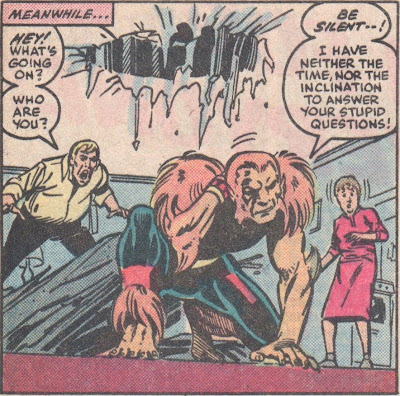I can't cook.
If you give me the most fantastic ingredients in the world, I'll throw them all in the same frying-pan, cook them the same way I always do, and serve them up... edible. You might finish, or you might politely tell me you're full before the end.
But don't keep silent, or I'll just serve up the same mixture again next time...
It's the fourth season-finale of new Doctor Who, and in light of the repetition of the last three years, beforehand I found myself pondering the following...
Just how would it end this year? Would there be yet another big public alien invasion? Would it again finish with one of the principle characters handily becoming God for a few minutes? And would someone then undo everything by turning time back once more? Other items of the regular formula on the ticklist were an irreconcilable resolution to the recurring element added-into the background of this series, (this time Rose trying to contact the Doctor across thousands of years) the return of this season's classic monsters (the Sontarans) and, of course, the unexpected return of the Daleks in the penultimate episode. Oh, and the cliffhanger on the very end with a stranger appearing inside the TARDIS.
I'm a tough audience, I know...
The Stolen Earth
Having just left the planet Shan Shen, and received a message from Rose to herself to tell herself to return to the Doctor, the Doctor and Donna race back to Camden (location implied later on posters) on a Saturday, to check that "everything" is okay. It appears to be.
Nipping back into the TARDIS, they ironically miss the abduction of most of planet Earth, along with its artificial satellites. (mobile phones are still functioning later) The moon remains, as do some bits of rubble, of indeterminate size, which are floating outside the also left-behind TARDIS. Why the TARDIS wasn't taken with the Earth is a question that never even gets asked. The Doctor does state that the TARDIS' location is "fixed", but that must be an observation rather than an active setting, or it couldn't have remained parked on a rotating, orbiting planet. The relative position of the rubble outside suggests that they are both still orbiting the sun together, for a few minutes at least.

The return of the on-screen non-diegetic caption from Midnight, again with the sound-effect of someone (the author? the producer?) typing it.
For the first time an alien invasion of present-day Earth is shown to have ramifications on existing characters and groups outside of the present Doctor Who cast, including on the other Doctor Who TV shows. Hence we see Martha at UNIT in New York, Jack, Gwen and Ianto at Torchwood in Cardiff, everyone at Sarah Jane's house in Ealing, and Donna's family in Chiswick. Captions tell us the towns/cities, Chiswick surely being a joke. I liked that – this was happening within walking distance of me!
Luke tells Sarah that the Earthquake they’ve just experienced "felt like some sort of cross-dimensional spatial transference." I'm still not sure if he was right.
Anyway, the hook is that it's suddenly night everywhere, and there are 26 new planets filling the sky, along with a large colourful cloud.
The opening credits showcase all the great ingredients that this show has going for it – a huge list of returning castmembers, so many that they have to fly by almost too quickly to read. The opening credits are great! Good to see Elisabeth Sladen in Doctor Who again.
We get the usual montage of international news programmes reporting the worldwide crisis. One of them features Richard Dawkins as the voice of reason, protesting how the different stars prove that the planets haven't come to Earth, but the Earth has been moved to the planets. This is great, in the fictional world of Doctor Who where all his other beliefs are concrete fact too. I wonder what he made of the rest of the science in this story?
At Torchwood, Jack tells Ianto "Someone's established an artificial atmospheric shell keeping the air and holding-in the heat." That explains that then, but not the gravity, or the tides, or the population's impending suffocation as the worldwide night has the planet's vegetation sucking-in all the oxygen. I'll just stop here, I'm sure you can extend this list in your own time.
Back in London, everyone has rioted, believing it to be "the end of the stinking world", yet again. I think this scene would have been a much easier to swallow if everyone in London had just carried on with their lives as normal, doing their Metro crosswords, not even remotely fooled this time.
Rose threatens two apparent looters in a computer-shop, but after they have run-off finds they've actually been using a computer to access the same program that UNIT, Torchwood and Mr Smith have to investigate the surrounding planets. She doesn't seem to realise that she's just become a part of the problem.
Martha phones Jack.
Martha: "I've been promoted – Medical Director on Project Indigo.
Jack: "Did you get that thing working?"
Martha: (curious)"Indigo's top secret. No-one's supposed to know about it."
I think maybe you just told him, Martha.
The Daleks, about to invade, radio ahead to, for no explained reason, say the word "Exterminate." 23 times. Well, y'know, they're Daleks, that's what they do.
We get Martha's reaction, Torchwood's reaction, Sarah's reaction, and Rose's reaction, which are all the same – recognition and fear. And here's where much of the rest of this tale gets spent – four factions all enacting the role of a single character. No wonder so little actually happens in this very slow story.
Jack tells Gwen and Ianto "There's nothing I can do. I'm sorry – we're dead." Jack appears to have forgotten that he can't die, including by extermination. Gwen and Ianto say nothing of his invulnerability either.
Back in the TARDIS, the Doctor has drawn a blank on where the Earth has gone, including not thinking of nipping back to watch, follow or stowaway on it. (he does a lot of standing around with no idea what to do in this one) In fact he's so out of ideas, that his best plan is to report the disappearance to the outer-space police.
Meeting the Judoon, his usual powers of translation fail him, so he speaks gibberish to them. Maybe it's their language. Or maybe it's his language. Either way, it's not quite the same groundwork as in Smith And Jones.
The Judoon are the first welcoming committee of the Shadow Proclamation, who are, in all but name, the Time Lords. Chop off the introductions and put the caption "Gallifrey" on the beginning and it's just like old times.
One Dalek actually says "MAXIMUM EXTERMINATION."
One of the Shadow Proclamation tells Donna two things, neither of which make sense.
i. "There is something on your back."
No, there isn't, not since last week.
ii. That she is sorry for the loss that Donna has yet to come. In other words, the Shadow Proclamation actually know the future and how this whole matter will end. (a bit like the Time Lords) The real mystery is therefore why they're all scratching their heads wondering where the missing 27 planets have all gone.
This foresight has apparently been shared by the Earth's bee-population, who have fled the planet many months earlier. It's a shame that they didn't also foresee the Earth's safe return at the end of this story. Anyhew, this somehow enables the Doctor to follow the Earth across space.
Another Dalek says "MAXIMUM EXTERMINATION." Fiends.
Bernard Cribbins gets to face-off with a Dalek again, resulting in the latter's line "MY VISION IS NOT IMPAIRED." Heh-heh-heh.
The Doctor follows the trail (something to do with the bees) through space to the Medusa Cascade, where it stops dead. He has no ideas, not even popping back to watch what happened here either. In his time-machine, he gives up. Once more, he can't think of anything to do.
Using the Subwave Network, ex-Prime-Minister Harriet Jones gets all the guest-cast together over webcams, further accentuating their single journey. Jack comes onto Sarah. If ever there were a female character who really should have turned him down, it's Sarah. Missed comic moment.

Top-left we have Harriet Jones, top-right Ianto Jones, bottom-right Martha Jones. None of these guest-characters are related, but they were all created in separate episodes by this author.
(Perhaps Sarah Jane Smith, Mickey Smith and Dr John Smith make this sort of formula normal in Doctor Who-land)
(I'd also like to think that afterwards Sarah, Francine, Jackie and Sylvia got together over another connection to share stories about their common single-parenthood)
Anyway, together they all hijack every single phone in the world (well, probably just the ones on digital exchanges) to make the loudest call in the world to the Doctor.
Sarah observes "Mr Smith now at 200%."
Upon being rumbled by the Daleks, Harriet transfers control of the Subwave Network to Torchwood, but rashly leaves the connection open.
Locking onto his friends' signal, the Doctor and Donna zero-in on the Earth's location and fly towards it. He says "The entire Medusa Cascade has been put a second out-of-sync with the rest of the universe." The planets were all there, just one second out-of-sync. Surely:
i. He and Donna would just have to wait one second to catch-up and see them, or
ii. The Medusa cascade shouldn't be present in both seconds.
It also bothers me that that's the same trick the Sontarans used on their ATMOS devices a few episodes back.
Davros finally shows up. I'm mightily disappointed that he's been recast again. Had the aging Kaled still been played by Terry Molloy then we would have at last had a link the original show post-Tom Baker, but still the new series avoids acknowledgement of those last eight seasons. (Maybe the 61-year-old Molloy is now too old to play the millennia-old Kaled)
Some fans have interpreted Davros' robotic arm as a reference to its getting shot in Revelation Of The Daleks, but in context the script makes it clear that Davros has voluntarily sacrificed his body's flesh to create more Daleks. "I gave myself to them, quite literally, each one grown from a cell of my own body." He even shows us his bony rib-cage:

Sure, it's not actually inconsistent with Revelation, but neither does this quite endorse it. All that said, Julian Bleach does do an excellent job in the role.
The Daleks say "EXTERMINATE TORCHWOOD", and you can't help but hopelessly cheer them on.
Jack, the only member of Torchwood who can't be killed, uses his teleport to leave, instead of oh I don't know maybe using it to save Gwen and/or Ianto's life.
Leaving Luke at home, Sarah drives her car right up to two Daleks, who decide to exterminate her. Sarah doesn't reverse again, or even get-out her trusty sonic lipstick. No, she just puts up her hands and pleads that she's sorry. Awful, this is hardly the hardy character we know from her own series.
The Daleks finally manage to fire a shot that actually hits the Doctor. David Tennant's final words in the role before regenerating are "I'm sorry. It's too late. I'm regenerating." They're not even trying to fool anyone with those dying words.
More non-diegetic writing, with more non-diegetic sound-effects...


Impressively, there's no Next Week trailer. Perhaps they've finally figured out that every time they come on, we turn over.
Journey's End
A nice touch – several of the guest-cast's names are timed to sneakily give the actors their own on-screen credits...




All three cliffhangers from last week are resolved with information that had not been foreshadowed beforehand. Sarah is saved by Jackie and Mickey materialising out of nowhere. Gwen and Ianto are saved when a security-defence kicks-in that they, and we, didn't know about. And the Doctor's regeneration? Well, Tennant babbles a heck of a lot of sudden retrospective explanations in this story, including the following here:
"You see? Used the regeneration energy to heal myself, but as soon as that was done I didn't need to change. I didn't want to – why would I? Look at me. So – to stop the energy going all away I siphoned-off the rest into a handy biometric receptacle, namely, my hand. My hand there. My handy spare hand. 'Member? Christmas Day? Sycorax? Lost my hand in a swordfight? That's my hand. What do you think?"
I think, Doctor, that you have just lost a regeneration. You now only have twelve lives, not thirteen.
Martha goes to Germany, where the flying Daleks are exterminating everyone in German. "Exterminieren!" I guess that's been a long time coming.
The Doctor says of the "parallel world" (I think he means alternate timeline) in Turn Left: "That world's running ahead of this universe!" Um, is it? Why? Dalek Caan certainly never used an emergency temporal shift in that universe, so I guess the destruction of that world's stars was due to events in this universe. Except that, by Doctor Who's pop-science, it would have taken millions of years for the light to reach Earth.
Donna seems to remember the whole of her time with the Doctor, and the whole of her alternate history in which she never met him too. 'Kay. I like that.
Rose says "The whole of reality, even the void was dead." This is the only explanation offered as to why all the Cybermen from Doomsday haven't broken through to this universe with Rose, but alas, it refers to the future.
The Doctor says "Last time we fought the Daleks they were scavengers. And hybrids. And mad." I guess that comment must be aimed at Jack, because that seems to be The Parting Of The Ways he's referring to.
The Doctor does everything he's told to by the Daleks, including even leaving the TARDIS and then acting all surprised and shocked when the Daleks then destroy it. (via another trapdoor) He's really not very proactive today.
The supreme Dalek says to the Doctor "You are connected to the TARDIS. Now feel it die." I guess the Doctor knew all along that it didn't actually get destroyed then.
Having had all its power drained-away, just as it's about to be destroyed, the TARDIS' power seems to come back on again.
When Donna parked her car near the TARDIS in Partners In Crime it was hardly a coincidence – they were both going into the same nearby building.
Martha has a conversation with a woman in German, which has no subtitles. I like that too.
Martha's great plan to save the multi-verse: "I reckon the Daleks need these 27 planets for something, but what if it becomes 26?" Erm, they get another one? Even if it has to be another Earth, they can get that from another universe.
Outstanding dialogue:
Davros: "The man who abhors violence – never carrying a gun. But this is the truth, Doctor, you take ordinary people and you fashion them into weapons. Behold your children of time – transformed into murderers. I made the Daleks, Doctor, you made this."
Doctor: "They're trying to help."
Davros: "Already I have seen sacrifice today, for their beloved Doctor. The Earth woman who fell opening the Subwave Network."
Doctor: "Who was that?"
Rose: "Harriet Jones. She gave her life to get you here."
Davros: "How many more? Just think – how many have died in your name? The Doctor – the man who keeps running, never looking back because he dare not, out of shame. This is my final victory, Doctor, I have shown you... your self."
This actually excuses how formulaic the proliferation of self-sacrificing guest-characters has become lately, but is backed-up by flashbacks that muddy the issue.
Some of them are from Christopher Eccleston's series (a bit out of place in a story that seems to be celebrating the Tennant-era), some are flashbacks from the Doctor's point-of-view (he doesn't know that his daughter lived) and still others are of deaths that we saw but he didn't. (Lynda) And there's Ursula, who sacrificed her life, until he saved it afterwards. The clips should have all been from either our perspective, or his. Unless I misunderstood what they were representing?
Supreme Dalek: "Universal reality detonation in 200 rels." Fortunately they're scaling their plans back a bit and only destroying the one universe today after all.
Aaaaanyway, having absorbed the Doctor's knowledge, Donna returns and uses a really convenient control-panel a few paces in front of the TARDIS to completely take-over the Dalek's guns, the reality bomb, and even the Daleks themselves, making them spin-around on the spot.
Yes, this season it's Donna's turn to save everyone by becoming God in the last episode. Martha must feel soooooo left out.
The Doctor presses a few buttons which reverse everything, sending all the planets back home, in space if not in time.
Doctor: "There's only one planet left!" (GAFFAWS) "Guess which one! But we can use the TARDIS! Holding Earth's stability... maintaining atmospheric shell..."
Yuh, he actually tows planet Earth "far across the universe", with it spinning at high-speed, intercut with shots of it's inhabitants hanging-onto stuff to keep their balance while enjoying the ride! Donna's fretting relatives seem particularly cheerful at the earthquake that is devastating their planet. When they get there, fortunately the moon is still in the same place, not having drifted-off or been drawn-into the sun or anything. I'll wager it was even facing in the right direction. There are no lines about its orbit getting replotted, so I guess it just kept-on orbiting nothing while the Earth was away.
BBC News 24's tickertape has the following to say on the subject:
... Earth is returned to it's (sic) original solar position. Celebrations are taking place across the planet as the human race breathes a sigh of relief. Celebrations are taking place simultaneously..."
On Earth, the Doctor says nothing to Sarah, who leaves so quickly that she never even tells him about her son, merely saying on the subject "It's a long story". The brevity of Doctor Who's goodbyes has always bothered me.
During the course of the episode, the Doctor's spare hand has regenerated into a duplicate of himself, also played by David Tennant. The return of so many other returning actors, together with flashbacks to the ninth Doctor's episodes, make Christopher Eccleston's absence a bit noticable. However if this was a rewrite, then they really needed to take-out what 'our' Doctor says to his duplicate.
"You were born in battle, full of blood, and anger, and revenge. (to Rose) Remind you of someone? That's me when we first met."
Alas, with Tennant delivering the line to his double, these words make little sense. How was this duplicate Doctor "born in battle, full of blood, and anger, and revenge"? It doesn't seem to quite fit the moment when his hand regenerated, nor when it was cut-off in The Christmas Invasion, nor the tenth Doctor's creation in The Parting Of The Ways. Apart from those three instances, I don't get what he's referring to.
This new Doctor is half-human. Much like our Doctor. Oh all right, I'll stay well away from that one...
This new Doctor is half-human, unlike our Doctor who is 100% Time Lord and always has been. The human element has come from Donna, which is why this new Doctor acts so much like she does. And, heh-heh, you'll never believe this, but the shallowest, cruellest thing Rose has ever done must surely be to reject 'our' Doctor in favour of kissing the Donna-Doctor right in front of him. And, it's implied, spending the rest of her life with him/her. I'd love to have seen her face when she found out – the real Doctor sure had the last laugh there.
The real Doctor and Donna sneak off in the TARDIS to deal with the other half of the human-Time Lord meta-crisis. Just as the duplicate Doctor has a mind much like Donna's, Donna now has a mind much like the Doctor's, which was the sole reason how she was able to defeat the Daleks and save the multi-verse. Now however her mind can't cope, so the Doctor wipes her memory of all her adventures with him and drops her back with her parents.
He tells them of her victory: "For one moment, one shining moment, she was the most important woman in the whole wide universe." That would be the moment when she was just like you then Doctor.
When the Doctor returns alone to enter his TARDIS at the end, it seems as though he's about to "What!" at a solitary Sontaran apologising for his poor timekeeping. Surprisingly, those boxes remain unchecked.
Neither do we ever find out how, or exactly why, Rose had appeared on so many TV screens across time and space calling to the Doctor throughout this series, let alone what the words "bad wolf" were doing everywhere at the end of Turn Left.
In conclusion.
This is the biggest pantomime in the show's history. It's all great fun, and I thoroughly enjoyed every minute of it, but like most pantomimes, the roughly-conceived plot only makes marginally more sense than a dream.
If we accept this romp as official Doctor Who history, then we must now also accept the long-disdained telethon story Dimensions In Time. I can find nothing to differentiate the two adventures' claims on canonicity.
Labels: doctor-who, tv









































 :)
:)

 Brett
Brett Random Dave
Random Dave Scottish Dave
Scottish Dave Frank
Frank Greg
Greg Herschel
Herschel Jacob
Jacob Jean
Jean Joe
Joe Jonathan
Jonathan Melissa
Melissa Melva
Melva Paul
Paul The Reynolds
The Reynolds Rhett
Rhett Sara
Sara Sarah
Sarah Tim
Tim My church
My church